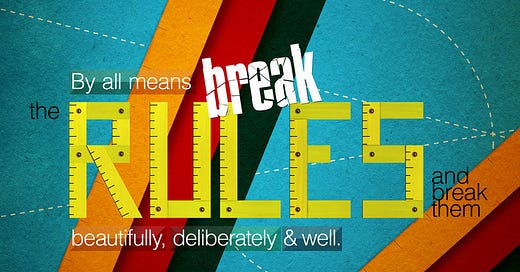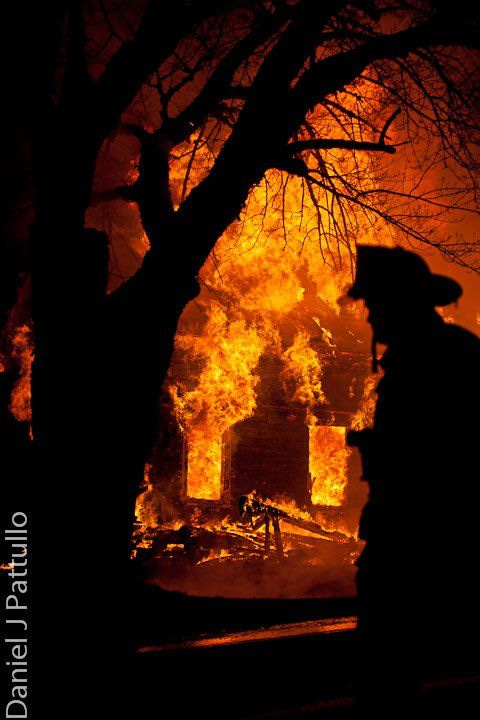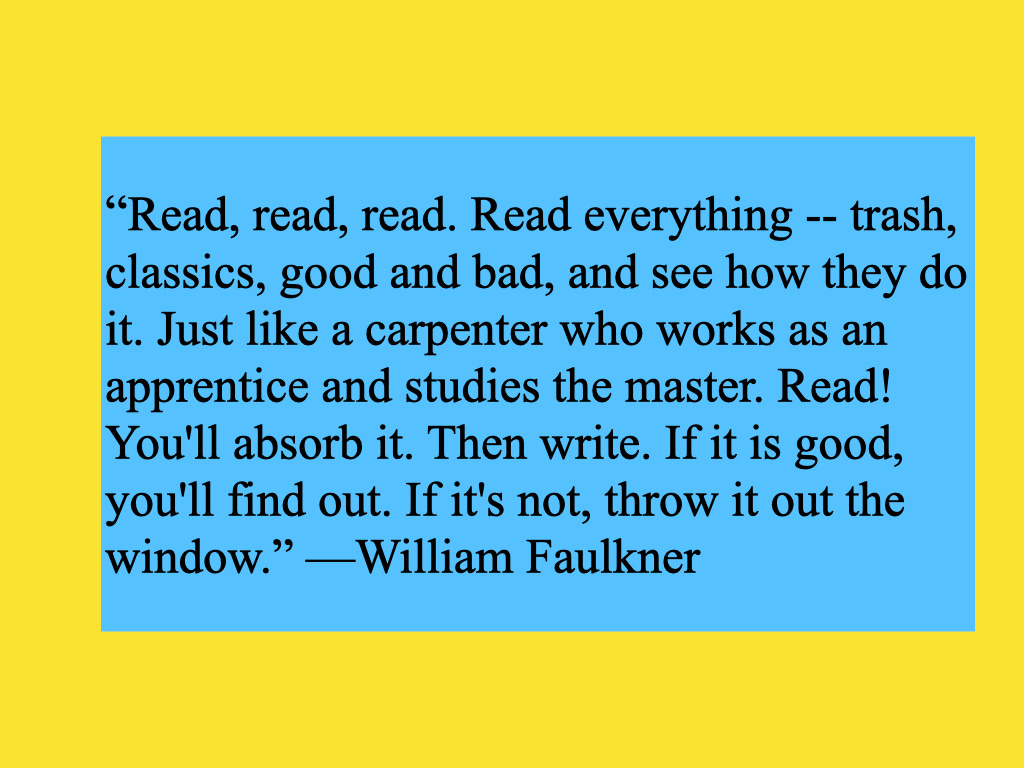Inspiration versus Perspiration: Lesson 1
Write it! How to get started
Let’s answer this question first—yep, the one I posed and answered in the clickable link ➡️intro to this course.
Q: Should I wait for lightning to strike? In other words, how do I get started?
A: Don’t wait for inspiration. Writers work all the time—even when they’re sleeping. When they’re lucky, the muse joins them. Part of that work is reading, good stuff and not-so-good stuff, and watching, yes, movies, anything and everything. The reason is that to write a good story, non-fiction or fiction, we need to understand the rules of narrative: How narrative that holds the reader or watcher works its magic—with one key caveat.
If there are 12 rules, the 13th rule is “Break all the rules,” but you can’t break a rule until you know the rule. Here’s how we’ll work together: We’ll read and we’ll watch (yes, movies and TV). The key is this: You gotta learn to read and watch as a writer—always analyzing and creating.
But in what order? And what do I mean by analyzing?
First, we need to begin to understand how creativity works and how that part of our process differs from analysis.
What I’m not going to do: I’m not going to mess with your process of invention. I am not going to tell you: Here’s the toolbox: Use it and you’ll be a great writer. Anyone who tells you this is lying. Did you hear me? LYING.
Those tool-box-how-to books may be able to tell you how to write formula stuff, whether it be the bodice buster or the formula mystery—and they may be able to help with some basic craft issues.
Let me assure you that great romance novels and great mysteries or memoirs, as examples, do NOT work with pre-determined formulas. We’ll be naming the great ones in future chapters.
If you want to write original, inspiring stuff that sings off the page, read on.
Here’s my hope: Once I help you see the craft in a writer’s or filmmaker’s work, you’ll never be able to read a story or watch a film the same way again.
What you need to do to understand inspiration: One simple exercise, a lesson I learned from the writer David Jauss.* Here it is:
1. On a piece of paper in long hand, write your name.
2. Now, write an alias.
Got that done?
Here’s what you just learned: In that beat, that moment of dropping away into your unconscious mind to write the alias—after all, you know your name—you found the place where the invention happens. It’s as simple as that.
Rule #1: Never mess with that. That place is where your voice, your story, your inspiration come from—and it’s a mysterious world that no workshop, no mentor, no teacher should ever mess with.
That’s where the muse will find you. That’s where the discovery lies.
But we need to read books and watch films and TV shows with a writer’s eye.
What I’m going to help you to do is show you how to see how great stuff becomes GREAT stuff, show you how to read a story like a writer, watch a great movie like a writer, enjoy a terrific episode of a TV series like a writer.
But here’s the key: Don’t let analysis of your writing interfere with its invention.
You’ll learn how to teach yourself through the analysis. That brings me to rule #2.
Rule #2: Learn how to forget. Here’s what I mean: You should never ever go back to the studying we do (except when you’re editing.)
Why? You won’t need to remember. The reason is that what you learn as we work together is now somewhere in your unconscious mind. You know already!
When you’re inventing, you need to forget. You need to write without thinking. Edit later.
Let me say it again: Editing is always a secondary task.
Rule #3: Never wait for inspiration. Write, write, write. The inspiration will find you. I promise you it will—as long as you remember to FORGET.
Writers who worry about the rules sit in judgment of themselves like the evil stepmother from Cinderella. The critic never lets the princess go to the ball.
Kill all the critics! We hate them.
A quote most of us know: “Showing up is 80 percent of life.” Sure, as this well-known quote goes on to say, “You could lie in bed and hide.” But I argue that you’ll get work done while you’re doing that, too.
So show up to that blank page and get some sleep. We’ll talk more about sleeping to invent soon!
Now, remember the alias you wrote. Remember that beat you took?
Here’s an example of how invention worked for me. It’s from my novel Who by Fire that I am putting up here as a serial. You may listen to me reading in every chapter. I learned bunches when I recorded it in an NPR Studio.
So, first I had this memory:
I once went to a barn-burning run by the fire department in rural Iowa and I journaled about it.
Remember, this: Save everything and start a journal if you haven’t already. I don’t mean a diary and we’ll talk more about this, too.
Here’s a super short excerpt that ended up as the first paragraph of my novel: An example of how invention worked for me. And, yes, I surprised myself.
That aspect of “surprise” turns out to be a key part of the process of invention. Click here for Chapter 1 and on the photo;
I would have told Lena about the fire I saw in Iowa, but it is regret that writes this, that longs for said things unsaid.
This fire would have amazed her. The heat was so incredibly hot it reminded me of something I learned in physics: the fact that the air around a lightning bolt is hotter than the surface of the sun. It was a barn burning—not with any political or racial overtones, but a necessary burn of an old wooden grain bin in the center of town in Whiting, Iowa, where I grew up. She was a Baltimore-grown city girl who wouldn’t be able to imagine this story of the burning though I suppose it’s a common enough event in rural parts of our country.
That I know something Lena couldn’t imagine amazes me.
I go home to Iowa—rarely—and, as it turns out, after Lena died, fortuitously: the controlled fire.
Assignment, or “Your mission should you choose to accept it”
is to watch the rom-com flick Hitch starring Will Smith.
Okay, okay. Did you just stop reading because Will Smith stars? Who can forget that slap at the Oscars—or the standing ovation that followed when he won the Oscar? Flawed human beings? Yep. We all are. But that doesn’t mean I’m never gonna watch Smith in a flick.
If that’s you, you might wanna skip this chapter and come back later? But this issue (so-called political correctness) is also something we should discuss. Let me know in the comments.
So, watch the movie. Yes, for fun—and sure it’s a rom-com and sure it does work on a formula—but let’s watch it like a writer.
Did I just contradict myself? You bet I did. ‘Cause we’re gonna watch and discuss “formula” stuff too!
The writing is good and I’ll talk about why it’s good in a chapter soon of Write It! How to get started. As I said in my intro: if you missed it, click ➡️ here, I’ll be interspersing essays and discuss the writing process for those too.
We’ll be back to this flick soon! A lot will depend on what you tell me you expect from me. I love to be in dialogue with writers and wannabes.
Questions? Weigh in now. Answers will appear in a comment or perhaps in a chapter you inspire—and I’ll credit you.
The floor is always open.
Let’s close with a quote:
Click ➡️ Lesson 2 “Should You Sell Direct?
Table of contents for all 19 lessons
Note for readers and wanna be writers: I teach Creative Writing. More free chapters will follow—so you get an idea of how I teach—then you’ll hit a paywall—and I’ve got teaching skills up the kazoo. Try me!
If you want to work one-on-one with me, I’m still offering that option. For a small fee, via Zoom, you will get an Eight-"session"-course—or more if you want them (each session includes 11 parts) with slides, experiments and much more content than in the chapters in this Substack course.
Email me at
mltabor@me.com
for details on how I work and we'll set up lessons.
Credits:
Banner: Write it! How to get started by Shannon Kellie
Image: Break the rules by taakoses on deviant art.com
*Jauss, David. "Lever of Transcendence: Contradiction and the Physics of Creativity," The Writer's Chronicle, Vol. 38, #5, p. 4.
Image: Space Shuttle Atlantis, liftoff, no attribution required.
Photo: Fire by Daniel Pattullo on Pinterest











Inspiring Mary. My reaction is similar to 'I wanna be like Mike' in sports, so I started to say 'I wanna be like Mary.' But no, that's not it. 'I wanna be like me.' And write.
Wonderful Mary. And also fun to learn the origin of Who By Fire. Life is always tugging on our sleeve with inspiration. “When you’re inventing, you need to forget. You need to write without thinking.”